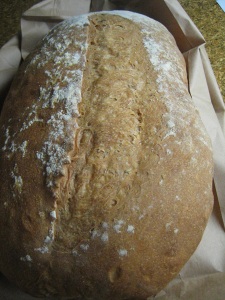I’ve had some trouble growing ears. Not that two isn’t enough. Scoring my bread and watching the dough spring up in the oven is a real joy, but recently I haven’t been getting a good defined ear. Last weekend I made a rustic rosemary bread that had great air pockets, definition, and crust. But despite scoring it in a way I thought was correct, based on some great tips, my bread is puffing out like a balloon and leaving a tiny little ear.
I want to go from lizard ears to elephant ears, so I’m going to try using a crock pot or a tagine this weekend for baking. If it works, I’ll be able to post pictures of my new big ears next week.
As I bake more bread, and I estimate I’ve done over 40 loaves in the past two months, I’m getting more efficient. I try to use the same bowl, use fewer utensils, and create a rhythm and order to building bread that requires the least steps across the kitchen and reduces dishwashing time. I don’t think I’m there yet, and sometimes my “efficiencies” eliminate a necessary step: I forgot the butter in a loaf of cinnamon raisin bread for a client so I had to make another last night. The more I simplify and streamline, the more energy and attention I have available for the task at hand. It occurs to me this might be a good technique for other things in life. Back in college I knew a jazz drummer who was hands-down the best jazz musician in the school. He said that he got to the point where he could play, and he was then working on taking away beats, playing less. Miles Davis was excellent at this. He could fill every empty second with sheets of notes, but he began to realize the power of silence, the musicality of restraint. Less is more, it’s true, and learning to simplify is harder than making something busier and more complicated. Maybe this is why a good baguette is the holy grail of bread-making—it’s got few ingredients but requires the highest level of technique and grace to execute well.


Ok–so maybe too much time on my hands this morning but here is some ear info. I found that might help…Deeper cuts is not the answer, according to the "pros." If your blade was really held at 20-30 degrees from flat, then, according to Hamelman, too deep a cut could cause the ear to collapse.So, try holding the blade as if you were skinning a fish and cut only 1/4 inch deep